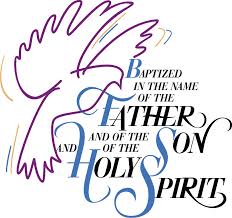
– 08 January 2023 –
The Baptism of the Lord
Gospel Text: Matthew 3:13-17
vs.13 Jesus came from Galilee to the Jordan to be baptised by John.
vs.14 John tried to dissuade him. “It is I who need baptism from you” he said “and yet you come to me!”
vs.15 But Jesus replied,
“Leave it like this for the time being; it is fitting that we should, in this way, do all that righteousness demands.”
At this, John gave in to him.
 vs.16 As soon as Jesus was baptised he came up from the water, and suddenly the heavens opened and he saw the Spirit of God descending like a dove and coming down on him.
vs.16 As soon as Jesus was baptised he came up from the water, and suddenly the heavens opened and he saw the Spirit of God descending like a dove and coming down on him.
Vs.17 And a voice spoke from heaven,
“This is my Son, the Beloved; my favour rests on him.
****************************************
We have four sets of homily notes to choose from.
Please scroll down the page to read them.
Michel DeVerteuil : A Trinidadian Priest, fmr director of National Centre of Biblical renewal .
Thomas O’Loughlin: Professor of Historical Theology, University of Nottingham
John Littleton: Director of the Priory Institute, , Tallaght, Dublin 24
Donal Neary SJ: Editor of The Sacred Heart Messenger
********************************************
Michel de Verteuil
Lectio Divina with the Sunday Gospels – Year A
www.columba.ie
************************************************
Textual Comments
The story of Jesus’s baptism is told in all four Gospels – an indication that the early Christians considered it an important event in the life of Jesus.
There are two aspects to the event:
– verses 13 to 15: something happened between Jesus and John the Baptist;
– verses 16 and 17: something happened to Jesus.
• Verses 13 – 15
Jesus’ baptism by John the Baptist seems to have caused much soul searching among the early Christians – how could the sinless Jesus subject himself to John’s “baptism of repentance”? The soul searching can be inferred from the way the successive gospel accounts tell the story:
 – Mark (the earliest) is straightforward: Jesus was baptised by John.
– Mark (the earliest) is straightforward: Jesus was baptised by John.
– Matthew ( a little later) agrees with Mark that Jesus was baptised by John, but adds a dialogue showing that both men were aware that there was a problem.
– Luke (still later) refers to the baptism but only as an introduction to the voice from heaven, and in any case makes no reference to John.
–John (the latest Gospel) makes no mention of the baptism.
Parallel texts are not directly a concern in lectio divina, since the method requires that we focus on the text before us – St Matthew’s in this case. However, parallels with other texts can give us an insight into the text, and for this reason we may want to refer to them (although it is never necessary to do so).
In today’s meditation we are free to focus either on Jesus or John the Baptist. In either case, awareness of the soul-searching behind the text reminds us that from time to time we too have to make choices which can be misunderstood. As happened with Jesus’ baptism, our communities may need time to clarify misunderstandings; we can be confident that once we do “what righteousness demands,” later “evangelists” will explain our actions to those who come after us.
a) Jesus: We can see a progression of thought from Mark to Matthew in explaining how Jesus came to “appear” on the banks of the Jordan. Whereas St Mark says that Jesus came from Galilee “and was baptised”, Matthew says he came from Galilee “to be baptised”. St Matthew stresses therefore that Jesus sought baptism by deliberate choice; he chose to leave his familiar surroundings and join the rest of the population in the national renewal movement.
He explains his position to John by saying, “We should do all that righteousness demands.” This is biblical language which must be interpreted. “Righteousness” means more or less the same as “salvation”, so Jesus is saying in effect, “There is an important work of salvation taking place in our country at this moment, and here and now (“for the time being”) I cannot stand aloof but must be part of it.” He is accepting fully the consequences of the Incarnation, the Word has truly become flesh and he must dwell among his brothers and sisters. He was to continue making this choice right through his life – the model of leaders who lead not “from above” but by “being with.”
b) John the Baptist becomes aware that he is ministering to someone greater than himself but still goes ahead with his ministry – “he gave in to him.” This is an experience that we have from time to time as parents, teachers, spiritual guides, community leaders. We become aware of our unworthiness and that we are the ones who “need baptism”. The result is that we accept our responsibility but with greater humility – it is only “for the time being.” This was also the response required of St Joseph when he was told, “Do not be afraid to take Mary home as your wife” (cf. 4th Sunday of Advent).
-Verses 16 – 17 : Jesus’ experience
Jesus’ baptism was a turning point in his life. Up to then he was a carpenter at Nazareth, now he would begin his ministry as an itinerant preacher of the Kingdom. The baptism therefore fits into the biblical pattern by which a call to do God’s work is preceded by a deep religious experience, e.g. Isaiah, Jeremiah, Gideon in the Old Testament, Mary and Zechariah in the New. Many saints of the church had similar experiences before embarking on a new stage in their lives, e.g. St Augustine, St Ignatius of Loyola, St Teresa of Avila and St Margaret Mary.
This shows us that God does not invite people to do his work without first assuring them of his undying love. We can recognise this truth from experience – ours and that of people who have touched our lives. God’s way of acting is a model for all who invite others to work with them – parents, spouses, community leaders.
“My favour rests on you” says that God’s love is permanent. We are reminded of Jesus’s words at the Last Supper: “As the Father has loved me so I have loved you, remain in my love” (John 15:9). St Matthew says that the experience came “after he came up from the water.” It was the fruit of his humility, “he who humbles himself is exalted.”
Jesus’s experience was first in symbols and then in words.
a) Verse 16 – symbols.
– “The heavens opened” – the barrier between God and humanity is removed, they can now communicate freely. We remember similar experiences of reconciliation with God: we thought that the heavens were closed to us, then “suddenly” (i.e. unexpectedly) they were opened.
– The Spirit of God descends like a dove and comes down on him. This is the positive aspect, an experience of God’s presence, real but gentle, not possessive or dominating.
b) Verse 17 – words (“a voice from heaven”). The words echo two Old Testament texts both in the context of a call to service:
– “This is my son” echoes psalm 2:7, “You are my son, today I have become your father”.
– “The Beloved, my favour rests on him” echoes Isaiah 42:1, “Here is my servant whom I uphold, my chosen one in whom my soul delights.”
Both are “feeling words” communicating intimacy and permanence.
Scriptural Reflective Prayers
“I am a shepherd who with his people has begun to learn a beautiful and difficult truth – our Christian faith requires that we submerge ourselves in the world.”
…Archbishop Romero in his acceptance speech when he was awarded an honorary doctorate by the University of Louvain
Lord, we pray that your church may always, like Jesus,
choose to go from Galilee to the Jordan to be baptised by John.
“Between the silence of God and the silence of my own soul stands the silence of the souls entrusted to me.” …Thomas Merton
 Lord, in our different vocations, you call us to minister to others
Lord, in our different vocations, you call us to minister to others
as parents, church ministers, friends, spiritual guides,
but every once in a while we find ourselves in the position of John the Baptist with Jesus.
People come to us to be ministered to
when it is we who would need to be ministered to by them:
– one of our children is more courageous than we are;
– holy people confess their sins to us;
– someone we admire greatly comes to us for advice;
– we are asked to pray for someone from a different religion one who is more spiritual than we are.
Our first response is to try and dissuade them,
but then we realise that we must leave it like this for the time being,
since this is what your saving will demands, and so we give in to them.
Lord, often in life moments of grace come after great trials.
We remember a time when we felt overwhelmed with troubles,
and it was as if we were drowning.
Somehow we survived, and as we came up from the water
the heavens opened and we felt your love descending on us gently like a dove.
We knew that we were your beloved, and that your favour rested on us.
“The church herself knows how richly she has profited by the history and developmnt of humanity.” …Vatican II, Document on the Church in the Modern World
Lord, in our time you have given humanity some  important new insights
important new insights
into the evils of racism, of sexism, of individualism.
We sometimes think that as a church we do not need conversion.
Teach us to be humble like Jesus,
to leave our comfortable Galilee and make our way to the Jordan to be baptised like everybody else by John the Baptist.
“God communicates himself to all persons, redeems them and stamps their being with an orientation towards sharing his life. … Karl Rahner
Lord, the role of the church in society today is to proclaim
that every human being is one for whom the heavens opened
and the Holy Spirit descended.
Lord, we remember with gratitude times when we had a deep experience:
– at the end of a retreat;
– at the Easter vigil liturgy in our parish;
– in the sacrament of reconciliation celebrated after many years.
As we came out, the heavens opened and we felt your Spirit descending upon us,
and we knew that your favour rested on us.
“Faith is like a canoe at evening coming in, like a relative who is tired of America, like a woman coming back to your house.” ... Derek Walcott, Caribbean poet
Lord, we thank you for the gift of faith,
the kind we experience quite suddenly coming out of the sea one day
when we know that the heavens have opened,
that your Spirit has come down upon us and your favour rests on us.
“Proud as I was, I dared to seek that which only the humble can find.” …St Augustine
Lord, we thank you for the times when you gave us the grace
to humble ourselves before you.
As soon as we did this and were coming up from the water,
suddenly the heavens opened and we saw your Spirit
descending like a dove and coming down on us,
and we heard a voice that spoke from heaven,
telling us that we were your Beloved and that your favour rested on us.
********************************************************
3. Thomas O’Loughlin,
Liturgical Resources for Advent and Christmas
www.columba.ie
Introduction to the Celebration
 Today we celebrate our faith in Jesus: he is the beloved of the Father, the anointed one, and the one on whom the Spirit rests. During the coming months we will be recalling each Sunday his works and preaching as the Chosen One of the Father, but Christians have always begun the retelling of the gospel of Jesus by reminding ourselves who Jesus is. The gospels tell us this by recalling that he was baptised by John the Baptist in the Jordan and at that moment the Father’s voice was heard and the Spirit appeared in the form of a dove.
Today we celebrate our faith in Jesus: he is the beloved of the Father, the anointed one, and the one on whom the Spirit rests. During the coming months we will be recalling each Sunday his works and preaching as the Chosen One of the Father, but Christians have always begun the retelling of the gospel of Jesus by reminding ourselves who Jesus is. The gospels tell us this by recalling that he was baptised by John the Baptist in the Jordan and at that moment the Father’s voice was heard and the Spirit appeared in the form of a dove.
Let us pause and reflect that we are here because we believe that Jesus is
‘the Anointed One,’‘the Christ,’‘the Messiah,’‘the One who does the Father’s will’.
Homily Notes
1. This is a good opportunity to give a simple catechetical homily whose aim is to impart some simple linguistic clarity in order to help people reflect on the gospel’s image more fruitfully.
2. We use the words ‘Jesus Christ‘ over and over again. Indeed, we use these two words so often side-by-side that we forget that they have any meaning. Sometimes, we almost think that the word ‘Christ‘ is just a surname tacked on as if one needed to distinguish several people called ‘Jesus‘. Most Christians use the words interchangeably. I have seen history books with the index entry: ‘Christ, J.’ followed by page numbers. When I asked a student what was the significance that her essay kept varying between using ‘Jesus said’ and ‘Christ said’, her answer was that she changed the usage simply to make it sound less repetitive! So this is a phrase whose significance we cannot take for granted.
3. But our confession of faith is that ‘Jesus is the Christ: The word ‘christos‘ means the marked one, the one who has been smeared with oil. But why use this as a description of Jesus? The people of Israel looked forward to the new David, the new King who would institute the Day of the Lord and his victory. David had been marked out as the chosen one of the Lord: ‘Then Samuel took the horn of oil, and anointed him in the midst of his brothers; and the Spirit of the Lord came mightily upon David from that day forward’ (l Sam 16:13). ‘To be marked out with oil’ is the same as ‘being the Anointed One‘ or, if one uses Hebrew, ‘the Messiah‘ or, if one uses Greek, ‘the Christ‘ or to say ‘he is the Chosen One of the Father:
 4. Jesus was not literally anointed with oil to mark him out as ‘the Anointed One: but in the gospels he is shown as being marked out by the Father’s voice and by the descent of the Spirit upon him. To say ‘Jesus is the Christ’ is to say he is the one who is uniquely the Son of the Father, and uniquely the bearer of the Spirit.
4. Jesus was not literally anointed with oil to mark him out as ‘the Anointed One: but in the gospels he is shown as being marked out by the Father’s voice and by the descent of the Spirit upon him. To say ‘Jesus is the Christ’ is to say he is the one who is uniquely the Son of the Father, and uniquely the bearer of the Spirit.
5. To say ‘Jesus is the Christ’ is to utter a basic creed which only makes sense when we imagine that statement within the scene we have just read in the gospel. To say ‘You, O Jesus are the Christ’ is to offer praise through the beloved Son to the Father in the Holy Spirit.
***********************************
John Litteton
Journeying through the Year of Matthew
www.Columba.ie
Gospel Reflection
Liturgical time is cyclical and passes rather quickly. It must do so because, every year, it remembers and makes effective the entire story of God’s salvation of his people (‘the gradual unfolding of the drama of salvation history’, as scholars often depict it).
We recently commemorated the birth of our Saviour on the first Christmas, as we do every Christmas. During those days we celebrated the reality of the Word becoming flesh, of God becoming human (the Incarnation), when we reflected on the newborn infant Jesus wrapped in swaddling clothes and lying in a manger.
Now, however, within a few days we have moved rapidly to Jesus’ public life, by-passing his adolescent and early adult years, which could be described as the hidden years — although the gospel records that he lived under the authority of Mary and Joseph in Nazareth. Today we commemorate his baptism in the River Jordan when the Holy Spirit descended on him at the beginning of his public ministry.
 Baptism was given a new meaning by Jesus and all Christians share in that meaning. We have been baptised into the Christian faith by water and the Holy Spirit, and our Christian faith teaches us that sacramental baptism is the gateway to the other sacraments.
Baptism was given a new meaning by Jesus and all Christians share in that meaning. We have been baptised into the Christian faith by water and the Holy Spirit, and our Christian faith teaches us that sacramental baptism is the gateway to the other sacraments.
There is powerful symbolism associated with water. It can sustain life and cleanse, by its thirst-quenching and purifying qualities. But it can also destroy that same life through drowning. Thus water has the potential to give life and to cause death. Too much water is as damaging as too little water.
The religious symbolism of water in sacramental baptism rev olves around our dying to alienation from God through the washing away of our sins, and around our new identity which is flourished and deepened by our sharing in God’s life and by being incorporated into the Body of Christ which is the Church.
olves around our dying to alienation from God through the washing away of our sins, and around our new identity which is flourished and deepened by our sharing in God’s life and by being incorporated into the Body of Christ which is the Church.
That is why we say that, in baptism, we die with Christ, going into the tomb with him, and we rise with him to a new and everlasting life. The significance of God’s invitation to share in this newness of life offered in baptism is well summarised in the words: ‘This is my Son, the Beloved; my favour rests on him’ (Mt 3:17).
Baptism is powerfully effective in our lives. The sacrament does what it is a sign of — in other words, it is efficacious. Thus it washes away Original Sin and restores us to the life of grace, which is God’s life in the soul. This baptismal dignity will continue to lead us to God if, when we sin, we repent and avail of the sacrament of reconciliation.
Throughout our lives, if we open our hearts to God’s loving presence and if we listen to the word of God, then our souls will be nourished and live in a healthy state of union with God’s will.
As we celebrate the Feast of the Baptism of the Lord, we have a timely liturgical reminder that we have been baptised into Christ’s death and resurrection. We share in his risen life through baptism and we know that God has made an irreversible commitment to us.
Let us renew again our commitment to the baptised life and its meaning which, from our perspective, focuses on living in faithfulness to the teaching of Christ and his Church regardless of the difficulties and challenges of that teaching. Let us recognise once more our need of God’s saving help in our everyday lives and let us rejoice that our souls will live because of the eternal life brought through the water of baptism at the outset of our Christian life.
For meditation
As soon as Jesus was baptised he came up from the water, and suddenly the heavens opened and he saw the Spirit of God descending like a dove and coming down on him. (Mt 3:16)
******************************************************************
Donal Neary SJ
Gospel Reflections for Sundays of Year A: Matthew
www.messenger.ie/bookshop/
‘You are beloved…’
Jesus’ baptism by John the Baptist had a different meaning from ours. It was more a baptism of sorrow for sin and of forgiveness; in this plunge into the river, Jesus identified with his people in his baptism.
At the baptism he heard the best words he could hear; You are my beloved. God led Jesus to John to hear these words.
One of us, one with us, he could now be one for us. Joy flooded his heart as he heard these words. Something happened for Jesus at that moment that only he could know – like bells ringing that only he could hear. Have you heard it in your life? At times we face the huge mysteries love, beauty, friendship, birth, death. And we know in the middle of it all , that we are beloved.
Our call is to be fully involved in life and love. The Christian is called to be involved with others at the times of need, of depth and mystery. Jesus did that – plunging himself into our humanity and with all of us.
The feast of the baptism is something new for all. The son of God is one of us. We have a new way of knowing God not just in the laws of old but in the new Spirit of Jesus.
So let the bells of love ring for us in God; and wherever we find it; let’s ring bells of love for all the most needy of God’s people.
Let the word ‘beloved’ echo in your mind and heart.
This is God’s word for you today.
Lord, thanks for calling me ‘beloved’
********************************************************************